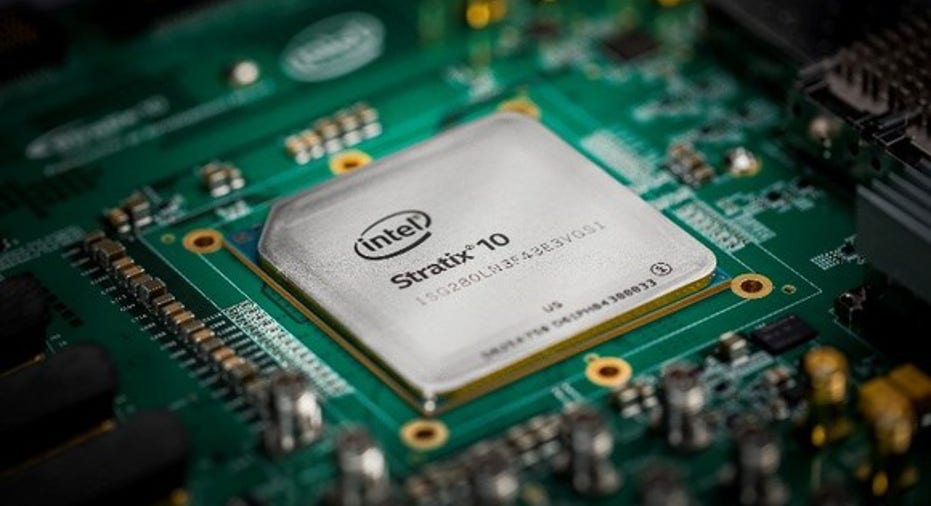What If Intel Corporation Loses 25% of the Server Market to ARM?

For many years now, a dark cloud has hung over Intel's (NASDAQ: INTC) highly successful data-center processor business: the prospect of ARM architecture-based servers. The fear is that if chip companies building processors based on the ARM architecture can collectively take a significant portion of business away from Intel in the server market, Intel's business would suffer, perhaps dramatically.
Intel hopes that integrating FPGAs, like the one shown above, with its processor technologies will allow it to better serve data-center customers. Image source: Intel.
ARM Holdings has said publicly that by 2020, it expects its partners will collectively capture 25% of the server processor market. Given that Intel has virtually 100% share, that 25% would necessarily have a significant and highly negative impact on Intel's financials.
Let's consider how the loss of such a large amount of market segment share in the server market could affect Intel's financials.
Doing some napkin math
Intel now expects its data-center group, or DCG, to see revenue growth in the "high-single-digits" percentage range -- let's call it 8%. If we assume that this level of growth continues through 2020, and if we assume that Intel doesn't lose any market segment share in that time, then Intel's total revenue from DCG in 2020 would be in the ballpark of $21.7 billion.
Next, if we assume that ARM expects its partners' revenue share to roughly track their unit share (i.e., 25% unit share translates into 25% revenue share), then this would imply that ARM expects its partners to capture approximately $5.43 billion in server chip revenue for themselves, leaving $16.27 billion for Intel.
In other words, if ARM and its partners achieve their shared goal, then Intel's DCG revenue in 2020 will be back to the levels that it saw back in 2015.
Does this sound realistic?
If ARM's partners do grab the kind of share that ARM is expecting, then their collective share gain would have to happen very rapidly. Intel hasn't given full-year guidance for 2017 yet, but executive Stacy Smith did say on the company's most recent earnings call that management expects to be able to grow its data-center business at a "robust growth rate."
Since Intel is apparently planning for DCG to grow in 2017, the substantial share loss that would need to occur for ARM to hit its targets would need to start in earnest during 2018 and probably accelerate quickly through the end of 2020.
This certainly isn't out of the realm of possibility, but it would take a combination of incredible execution on the part of several ARM-based server chip vendors, as well as what could only be described as very poor execution on Intel's part for that scenario to realistically play out.
Considering Intel's track record here of continued product and market-share leadership and the track records of the various ARM-based vendors -- which is to say, a lot of talk, but also a lot of mediocre products that haven't gained much traction in the marketplace -- ARM has probably placed a little too much faith in its partners' abilities.
Intel can't afford to rest on its laurels, though
Although ARM's market share prediction seems overly optimistic, particularly in the timeline given, Intel cannot afford to rest on its laurels or make business decisions under the assumption that it won't face credible threats.
Indeed, Intel should work as if its competition is just one product generation away from potentially disrupting its lucrative data-center business. Given that the company continues to step up its investments in DCG, it's likely that management is doing just that.
A secret billion-dollar stock opportunity The world's biggest tech company forgot to show you something, but a few Wall Street analysts and the Fool didn't miss a beat: There's a small company that's powering their brand-new gadgets and the coming revolution in technology. And we think its stock price has nearly unlimited room to run for early in-the-know investors! To be one of them, just click here.
Ashraf Eassa owns shares of Intel. The Motley Fool recommends Intel. Try any of our Foolish newsletter services free for 30 days. We Fools may not all hold the same opinions, but we all believe that considering a diverse range of insights makes us better investors. The Motley Fool has a disclosure policy.



















